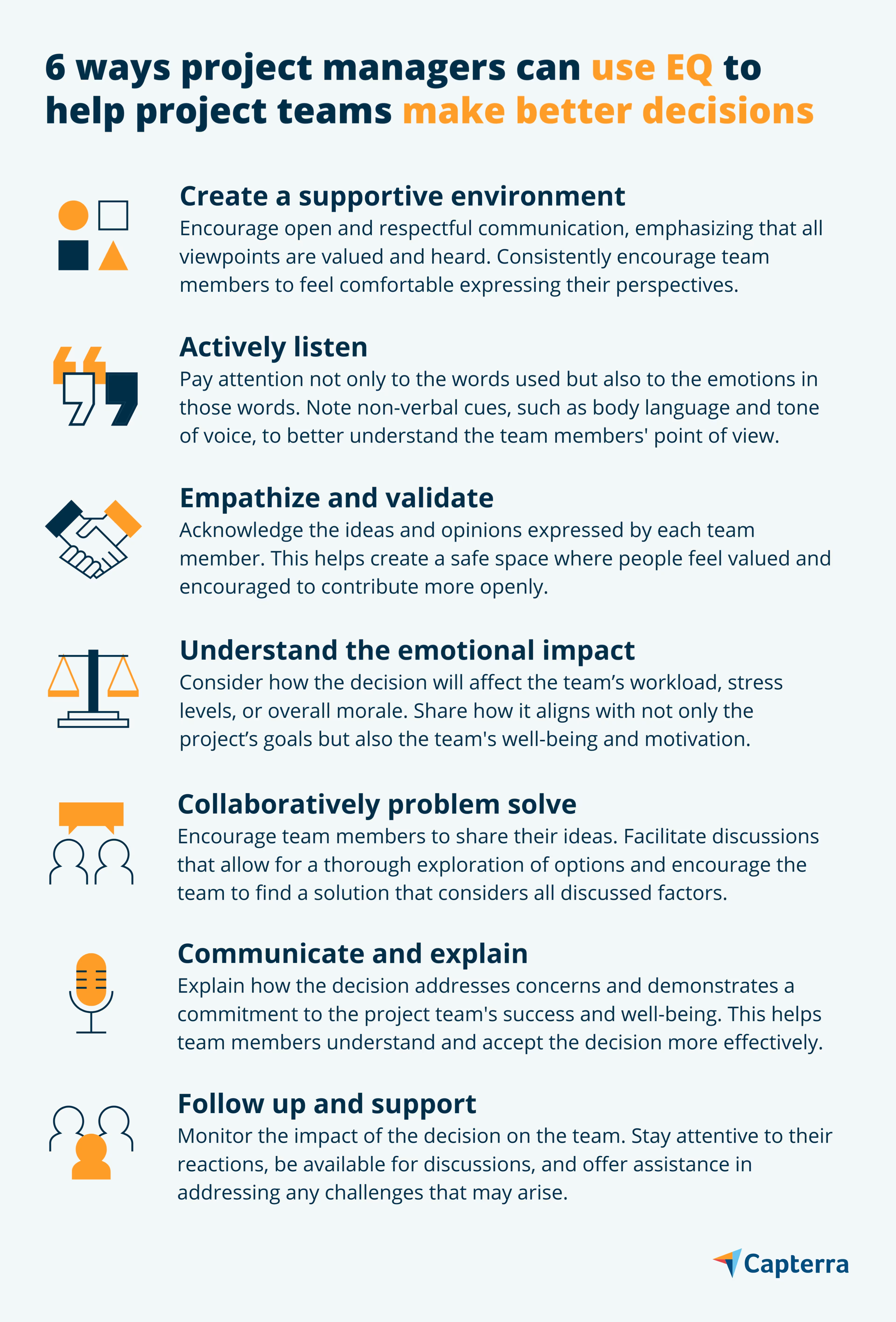The research is clear: EQ can improve team cohesion and decision-making.
Project teams face a myriad of challenges that require more than just technical expertise or task management. A project manager (PM) with high emotional intelligence, or emotional quotient (EQ), can be the key to navigate complex team dynamics, foster cooperation, resolve conflicts, and make better decisions.
What is emotional intelligence?
Our definition of emotional intelligence follows the medical industry standard: Emotional intelligence is your ability to perceive, use, understand, manage, and handle your own emotions as well as others'.
Sixty-seven percent of PMs say they're rated on EQ in their performance review, demonstrating that employers recognize the benefits. To learn about how emotional intelligence (EQ) is used in project management, we surveyed 239 project managers (PMs) in our 2023 Emotional Intelligence in Project Management Survey.*
/ Key highlights
81% of surveyed PMs agree that their leadership understands the importance of EQ in project management, and most consider EQ in performance reviews.
77% of the most successful project managers say EQ is very important and are using the skill more often over the past two years.
83% of PMs report often to always incorporating EQ-based techniques in their project management responsibilities.
50% of the most successful PMs always do, compared to just 19% of the rest of the surveyed PMs.
How EQ improves your power skills: cooperation and conflict management
Cooperation and conflict resolution are the top two most important aspects of EQ to develop, according to our research. Leverage these skills for a high-EQ approach to two common project management scenarios.
EQ power skill: cooperation
Project managers with high emotional intelligence can regulate their responses, remain calm in challenging situations, and provide a sense of psychological safety within their team. This cultivates a cooperative atmosphere where team members feel valued, understood, and motivated to work together for the project, leading to enhanced cooperation.
/ Scenario: disengaged team member
During a daily standup meeting, you notice that one team member appears disengaged and gives unhelpful updates on their tasks, hindering the team from collaborating as needed to finish the work. When you ask questions trying to get them to open up, they withdraw from the discussion.
Instead of probing the issue in front of the team, reach out to them after the standup with this high-EQ approach:
Start by expressing appreciation for their work they’ve been putting into the project and, if possible, assure them that this conversation is a safe space for them to share their concerns.
Ask open-ended questions to understand the root cause of their stress and actively listen without judgment. It can help to summarize what you’re hearing back to them after they’re done sharing, giving them the opportunity to provide clarification.
Offer reassurance and support that together you can come up with a plan to help alleviate the pressure. Depending on the nature of their issue, whether perhaps they’re struggling in their personal life or don’t respect the project work for a myriad of reasons, your response here needs to be measured and tailored. Be sure to follow your company’s policies on performance management at all times.
Collaboratively develop strategies to address those challenges, fostering a supportive team environment and ensuring everyone's well-being and productivity during the project.
When you’re able to accurately perceive the emotions of others and respond appropriately, you can encourage and influence the team member to collaborate with the project team.
EQ power skill: conflict resolution
High-EQ PMs have the ability to empathize with the perspectives of others involved in the midst of conflict and can facilitate constructive dialogue, encourage flexibility, and reach resolutions that satisfy the needs of all parties involved. This ultimately leads to more effective and sustainable conflict resolution. Let’s look at an example.
/ Scenario: conflict amongst the team
During a team meeting, two team members start a heated argument regarding the allocation of hours for a task. A high-EQ PM would recognize the escalating tension and intervene using emotional intelligence tactics such as:
De-escalate immediately by lowering the volume of your voice and calmly addressing both individuals, acknowledging their emotions and the value of their perspectives. This shift can often be enough to reduce the tension and allow for calm discussion.
Ask both team members if they’d like to discuss the issue now or schedule time separately. If they decide to discuss now, give each person time, uninterrupted, to express their concern.
Summarize the key points of each person’s shared opinion to ensure understanding and agreement on what the issue is.
Decide how to find a resolution together, being open to their ideas about what to do. One option can be to schedule a brainstorming session with the other team members to find a resolution.
Through your emotional intelligence, you can help de-escalate the conflict, promote understanding, and guide the team toward a resolution that respects everyone's needs.
How to improve team decision-making using emotional intelligence
Our research finds that 92% of PMs think a high level of EQ within a project team positively impacts the quality of strategic decision-making. But PMs need to consistently demonstrate emotional intelligence in order to lay a strong foundation before an important decision needs to be made. This creates an environment where team members feel comfortable expressing their ideas and concerns, leading to a better understanding of the project's challenges and making it possible to find solutions together.
Here are six way you can use EQ to help your project team make better decisions:

By applying EQ in the decision-making process, PMs can create an environment that values everyone’s perspective and leads to better decisions that consider both the rational and emotional needs of the team.
Top challenge tips for identifying your own emotions
We asked project managers what area of EQ they struggle the most to adopt or demonstrate as a PM. The top answer: identifying their own emotions. Identifying and understanding your emotions is crucial for effective self-management, which helps you navigate conflict and build cooperative project teams.
Here are five tips for identifying your emotions as a project manager:
Self-reflection: Pause and examine your thoughts, feelings, and reactions throughout the day, acknowledging and labeling them.
Body awareness: Physical cues, such as an increase in heart rate or muscle tension, can help you identify and understand what triggers elevated emotions.
Mindfulness: Practice being present in the moment and observe your thoughts and emotions without judging yourself or the quality of your thoughts.
Journaling: Jot down your thoughts and emotions regularly to help gain insight into patterns and triggers that evoke specific emotions.
Seek feedback: Encourage peers or trusted individuals to share their observations and insights on how your emotions are perceived by others.
Self-improvement is hard work, and it’s okay to feel frustrated with yourself at times. Set realistic expectations for your progress on improving your EQ. It can be helpful to pick one or two specific goals, such as identifying what makes you angry at work, and then focus on improving your response over several months.
Consistency is key
PMs need to demonstrate their emotional intelligence on a regular basis and consistently with everyone. This consistency increases your influence and impact on the team’s ability to resolve conflicts and cooperate to achieve project success.
In fact, 50% of the self-reported most successful PMs report always incorporating EQ-based techniques in their project management responsibilities, compared to just 19% of the ones who report being less successful. Ultimately, consistent display of EQ by the project manager strengthens team dynamics, boosts engagement, and fosters collaboration, leading to more successful project outcomes.
In addition, be sure your team has the necessary tools to collaborate and visibly manage project tasks in support of your EQ efforts. Over half of PMs (52%) report using either manual methods or a software tool that’s not designed for project management. These methods can undermine your efforts to build team cohesion and collaboration with time-sucking oversight and management.
If you’re interested in project management software, you can start with our buyers guide or jump to the highest-rated vendors on our Shortlist.
